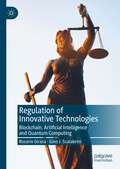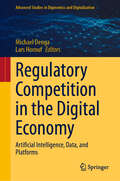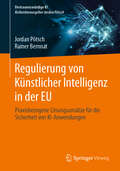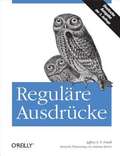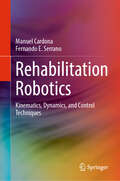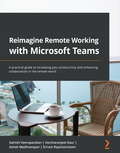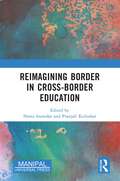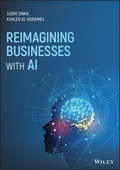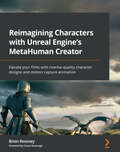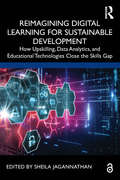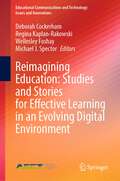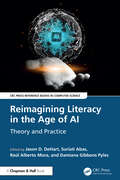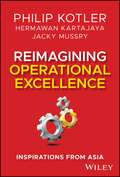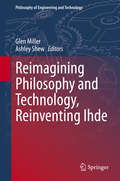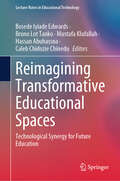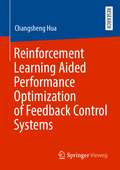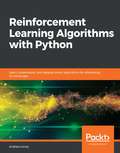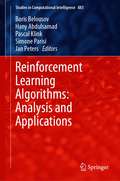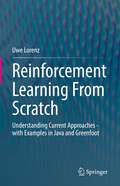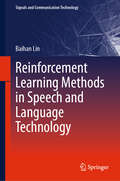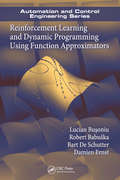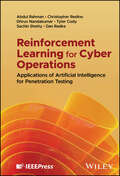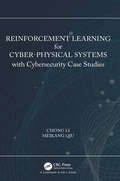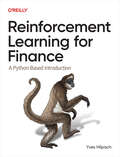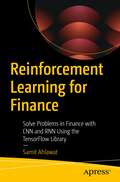- Table View
- List View
Regulation of Innovative Technologies: Blockchain, Artificial Intelligence and Quantum Computing
by Rosario Girasa Gino J. ScalabriniThis book explores the regulation of emerging technologies. Developments such as bitcoin (based on blockchain technology), artificial intelligence, quantum computing, and other technical advances have the potential to revolutionize many aspects of everyday life. As with other significant occurrences, especially when coupled by financial rewards, there are the inevitable attempts to reap gains unlawfully. This book examines the legal and regulatory enactments that attempt to undermine the risks to society as well as the dangers to individual freedoms that the technologies present when abused by governmental and non-governmental authorities. Included are discussions of the dangers to the right of privacy posed by facial recognition, physical location tracking, automated license plate recognition (ALPR) and other evolving applications of technology. This book is an invaluable resource for those interested in the regulation of emerging technologies particularly as they relate to blockchain, artificial intelligence, and the most current advances in quantum computing. Emphasis is focused on invasion of privacy, particularly by government authorities, antitrust implications of private companies and the efforts of international entities to counter alleged abuses by them.
Regulatory Competition in the Digital Economy: Artificial Intelligence, Data, and Platforms (Advanced Studies in Diginomics and Digitalization)
by Lars Hornuf Michael DengaThe digital economy is reinvigorating regulatory competition, yet little is known about which rules and jurisdictions can effectively bind companies nor what competitive motivations underlie certain rules. In addition to purely economic motives, legislators are now also driving the pursuit of digital sovereignty and the enforcement of social values in digital spaces. It also remains unclear what regulatory weight the self-regulation of private companies has in multi-level governance systems. This book examines regulatory competition in the three main pillars of digital markets: artificial intelligence, data, and platforms. It brings together legal scholars, economists and information systems experts, providing relevant examples and structured analysis of the aims and outcomes of regulatory competition in the digital economy. “A timely exploration of the balancing acts regulators must perform to manage private power in a globalized digital economy. Essential for understanding the intersection of law, economics, and technology in the contemporary digital ecosystem.” Jens Frankenreiter, Associate Professor of Law, Washington University “The book by Denga and Hornuf provides a comprehensive and timely exploration of the intricate regulatory challenges posed by big data, artificial intelligence, and platforms in the Digital Single Market. If offers critical insights for policymakers, scholars, and businesses navigating this evolving landscape.” Philipp Hacker, Professor for Law and Ethics of the Digital Society, European University Viadrin “Artificial Intelligence is fundamentally disrupting how we enable economic growth and how we regulate fair competition. Luckily, Denga and Hornuf provide a detailed and comprehensive overview of the thorniest and most complex regulatory issues while at the same time offering thoughtful and feasible solutions. "Regulatory Competition in the Digital Economy" is a treasure trove for anyone interested in market regulation, fair competition, consumer protection, and geopolitical questions.” Sandra Wachter, Professor of Technology and Regulation, Oxford Internet Institute
Regulierung von Künstlicher Intelligenz in der EU: Praxisbezogene Lösungsansätze für die Sicherheit von KI-Anwendungen (Vertrauenswürdige KI)
by Rainer Bernnat Jordan PötschDieses Buch bietet eine praxisorientierte Einführung in die Regulierung von Künstlicher Intelligenz (KI) in der EU. Es vereint theoretisches Wissen mit konkreten Handlungsempfehlungen zur Umsetzung von KI-Standards und Gesetzen, insbesondere im Rahmen des EU AI Acts. Durch eine speziell entwickelte Systematik werden KI-relevante Gesetze und Standards systematisch erfasst und bewertet. Führungskräfte, CISOs und Cybersecurity-Experten erhalten wertvolle Einblicke, wie sie die Vertrauenswürdigkeit von KI-Systemen in ihren Organisationen gewährleisten können. Ein besonderer Schwerpunkt liegt auf der Integration von KI in bestehende Sicherheitsstrukturen sowie der Nutzung bewährter Frameworks.
Reguläre Ausdrücke
by Jeffrey E. F. FriedlReguläre Ausdrücke sind ein leistungsstarkes Mittel zur Verarbeitung von Texten und Daten. Wenn Sie reguläre Ausdrücke noch nicht kennen, wird Ihnen dieses Buch eine ganz neue Welt eröffnen. Aufgrund der ausgesprochen detaillierten und tiefgründigen Behandlung des Themas ist dieses Buch aber auch für Experten eine wahre Trouvaille. Die neue Auflage dieses anerkannten Standardwerks behandelt jetzt auch die Unterstützung regulärer Ausdrücke in PHP sowie Suns java.util.regex. Der klare und unterhaltsame Stil des Buchs hat schon Tausenden von Programmierern das an sich trockene Thema nähergebracht, und mit den vielen Beispielen zu Problemen aus dem Programmieralltag ist Reguläre Ausdrücke eine praktische Hilfe bei der täglichen Arbeit. Reguläre Ausdrücke sind überall Sie sind standardmäßig in Perl, PHP, Java, Python, Ruby, MySQL, VB.NET und C# (und allen Sprachen des .NET-Frameworks) sowie anderen Programmiersprachen und Werkzeugen eingebaut. Dieses Buch geht detailliert auf die Unterschiede und Gemeinsamkeiten bei der Behandlung regulärer Ausdrücke in diesen Sprachen und Werkzeugen ein. Besonders ausführlich werden die Regex-Features von Perl, Java, PHP und .NET behandelt. Reguläre Ausdrücke sind mächtig Reguläre Ausdrücke sind sehr leistungsfähig und flexibel. Dennoch bleibt ihre Anwendung oft unter ihren Möglichkeiten. Mit regulären Ausdrücken können Sie komplexe und subtile Textbearbeitungsprobleme lösen, von denen Sie vielleicht nie vermutet hätten, daß sie sich automatisieren lassen. Reguläre Ausdrücke ersparen Ihnen Arbeit und Ärger, und viele Probleme lassen sich mit ihnen auf elegante Weise lösen. Reguläre Ausdrücke sind anspruchsvoll Was in der Hand von Experten eine sehr nützliche Fähigkeit ist, kann sich als Stolperstein für Ungeübte herausstellen. Dieses Buch zeigt einen Weg durch das unwägbare Gebiet und hilft Ihnen, selbst Experte zu werden. Wenn Sie die regulären Ausdrücke beherrschen, werden sie zu einem unverzichtbaren Teil Ihres Werkzeugkastens. Sie werden sich fragen, wie Sie je ohne sie arbeiten konnten.
Rehabilitation Robotics: Kinematics, Dynamics, and Control Techniques
by Manuel Cardona Fernando E. SerranoRehabilitation robotics is an important field of study focused on improving the gait rehabilitation of people affected by neurological disorders, ictus, cerebral palsy, and spinal cord injuries, among others. The study of rehabilitation robotics includes medical activities, kinematics dynamics, and control analysis. This book presents a complete and exhaustive analysis of the kinematics and dynamics of exoskeleton robots for rehabilitation. The forward and inverse kinematics are studied using the geometric, Denavit-Hartenberg, and screw theory approach. The dynamics analysis of exoskeleton robots using Newton-Euler, Euler–Lagrange, and D'Alembert formulation are also studied. Moreover, the main control techniques for exoskeleton robots are analyzed, including robust control, impedance control, adaptive control, Lyapunov functions, and uncertainties found in dynamic systems. The book includes MATLAB applications and examples.
Reimagine Remote Working with Microsoft Teams: A practical guide to increasing your productivity and enhancing collaboration in the remote world
by Sathish Veerapandian Harsharanjeet Kaur Ashok Madhvarayan Sriram RajamanickamGet a 360-degree view of Teams as a secure collaboration tool with best practices and recommendations for using Teams efficientlyKey FeaturesMaster and manage virtual meetings easily using TeamsUnderstand the essential security and administration aspects of Microsoft TeamsCommunicate and collaborate effectively with your colleagues using Teams and M365 apps such as Sway, Yammer, and StreamBook DescriptionThe outbreak of the pandemic has forced the world to embrace remote working and the modern style of virtual business. However, end users may find it challenging to cope with this sudden change in working style, not aware of all the features and remote working tools available to make their life easy. Microsoft Teams is an exceptional platform, adopted by many organizations for unified communication and collaboration, and this book will help you to make the most of its capabilities. Complete with step-by-step explanations and screenshots, this book guides you through the topics that you'll find useful in your daily use of Teams. You'll learn how to manage your teams and projects with Microsoft Teams in a structured and organized way. The book provides hands-on information with a focus on the end user side to help corporate users to increase productivity and become a Microsoft Teams superuser. Finally, you'll explore the most effective ways of using the app with best practices and tips and tricks for making the most of the features available for your scenario. By the end of this Microsoft Teams book, you'll have mastered Microsoft Teams and be fully equipped as a modern collaboration end user to effectively increase your remote work productivity.What you will learnFind out how to secure your documents and data with Microsoft's securityImprove your organization's productivity and engagement with Microsoft TeamsIntegrate Teams with other Office 365 apps such as SharePoint, OneNote, and OneDriveAutomate your regular tasks with easy end-user automation optionsDiscover best practices and etiquettes for using Teams efficiently and effectivelyExplore tips and tricks from expert MVP and Microsoft Certified Trainer (MCT) authorsWho this book is forThis book for anyone who wants to improve their day-to-day productivity using Microsoft Teams. Anyone with access to Office 365 apps will find this book useful irrespective of their designations. Fundamental knowledge of Microsoft Office 365 Applications is required.
Reimagining Border in Cross-border Education
by Neeta Inamdar Pranjali KirloskarUniversities are inherently and definitionally universal in their quest for the creation and dissemination of knowledge. They are set to defy borders that exist in parochial forms. Globalization which opened up borders has by design or default created inequalities and imbalances in knowledge systems. Undoubtedly, knowledge is power but there is difference in the power that is intrinsic to it and the power that is ascribed which is determined by dominant political and economic hierarchies. If knowledge predominantly flows from global north to global south, people seeking knowledge move from global south to global north. These imbalances are also seen within these regions, between cultures and communities, one claiming superiority over the other. These realities call for a reassessment of not only what constitutes knowledge, but also what encompasses the idea of borders. This book elaborates on the inclusive role of education that can act as an equalizer or as a catalyst for creating a level playing field across borders. Print edition not for sale in South Asia (India, Sri Lanka, Nepal, Bangladesh, Pakistan and Bhutan)
Reimagining Businesses with AI
by Sudhi Sinha Khaled Al HuraimelDiscover what AI can do for your business with this approachable and comprehensive resource Reimagining Businesses with AI acquaints readers with both the business challenges and opportunities presented by the rapid growth and progress of artificial intelligence. The accomplished authors and digital executives of the book provide you with a multi-industry approach to understanding the intersection of AI and business. The book walks you through the process of recognizing and capitalizing on AI’s potential for your own business. The authors describe: How to build a technological foundation that allows for the rapid implementation of artificial intelligence How to manage the disruptive nature of powerful technology while simultaneously harnessing its capabilities The ethical implications and security and privacy concerns raised by the spread of AI Perfect for business executives and managers who seek a jargon-free and approachable manual on how to implement artificial intelligence in everyday operations, Reimagining Businesses with AI also belongs on the bookshelves of anyone curious about the interaction between artificial intelligence and business.
Reimagining Characters with Unreal Engine's MetaHuman Creator: Elevate your films with cinema-quality character designs and motion capture animation
by Brian Rossney Ciaran KavanaghDiscover the power of Unreal Engine 5 and the MetaHuman Creator to develop realistic digital characters, infusing them with full body and facial animationKey FeaturesCreate realistic characters using the MetaHuman Creator using a mixture of preset and custom toolsImport your character into Unreal Engine 5 to access more editing options and begin animating itCombine face and body motion capturing to fully animate your digital humansBook DescriptionMetaHuman Creator (MHC) is an online, user-friendly 3D design tool for creating highly realistic digital humans that can be animated within Unreal Engine (UE) and enhanced with motion capture technology. This means that filmmakers and game developers now have access to a high quality, affordable solution that was previously only available to specialist studios. This book will focus on using UE5 and MHC from a filmmaker angle. Firstly, you'll understand how to use the online MHC to create a digital character, changing its facial structure, body type, and clothing. After that, you'll learn all the necessary steps to bring the character into UE5 and set it up for animation. Then, using an iPhone and a webcam to capture face and body movements, you'll mix these motion capture files, refine the animations using the MetaHuman Control Rig, and save these takes to be reused and edited again within the Level Sequencer. On top of that, you'll learn how to create a rendered video file for film production using both the Level Sequencer and a VR Cinematic Camera. By the end of this book, you'll have created your own MetaHuman character, as well as face and body motion capture data, and learned the necessary skills to give your future projects further realism and creative control.What you will learnCreate your own bespoke character using MHCDevelop custom faces based on real peopleUtilize Blueprints to take control of your digital characterRetarget animations using the Unreal MannequinUse DeepMotion and Live Link for complete body and face animationUse the Control Rig to refine animationsExport and render your characterWho this book is forThis book is for filmmakers and hobbyists who are planning to make a film using Unreal Engine for the first time, having worked in live action or purely digital media previously, either professionally or as a hobby. No experience with Unreal Engine is required, however it is useful to have some knowledge of 3D development applications and concepts like wireframes, skin weights, transform tools, and motion capture. It is recommended that you have access to an iPhone X (or a later model). Alternatively, you can use a free or paid version of Faceware, along with a basic webcam.
Reimagining Digital Learning for Sustainable Development: How Upskilling, Data Analytics, and Educational Technologies Close the Skills Gap
by Sheila JagannathanReimagining Digital Learning for Sustainable Development is a comprehensive playbook for education leaders, policy makers, and other key stakeholders leading the modernization of learning and development in their institutions as they build a high value knowledge economy and prepare learners for jobs that don't yet exist. Currently, nearly every aspect of human activity, including the ways we absorb and apply learning, is influenced by disruptive digital technologies. The jobs available today are no longer predicators of future employment, and current and future workforce members will need to augment their competencies through a lifetime of continuous upskilling and reskilling to meet the demands of the Fourth Industrial Revolution. This book features curated insights and real-world cases from thought leaders throughout the world and identifies major shifts in content formats, pedagogic approaches, technology frameworks, user and design experiences, and learner roles and expectations that will reshape our institutions, including those in emerging economies. The agile, lean, and cost-effective strategies proposed here will function in scalable and flexible bandwidth environments, enabling education leaders and practitioners to transform brick-and-mortar learning organizations into digital and blended ecosystems and to achieve the United Nation’s ambitious Sustainable Development Goals by 2030.
Reimagining Education: Studies and Stories for Effective Learning in an Evolving Digital Environment (Educational Communications and Technology: Issues and Innovations)
by Deborah Cockerham Michael J. Spector Regina Kaplan-Rakowski Wellesley FoshayTechnology has developed at a tremendous rate since the turn of the century, but educational practice has not kept pace. Traditional teaching practices still predominate in many educational settings, and educators are often intimidated by new technology. However, as tragic as the COVID-19 pandemic has been, it has caused many people to rethink education and opportunities provided by new technologies for effective teaching and learning. How can educational communities of practice be reimagined to support a growth mindset for learning? This volume explores innovative visions for 21st century learning. The content explores the experiences of teachers with new technology, presents research studies that highlight effective strategies and technologies, and shares lessons learned from a unique researcher-practitioner mentoring model. Educational approaches that worked well, challenges that were difficult to overcome, and potential benefits of effective technology integration will encourage readers to reimagine education and implement practices that can strengthen the future of online education.
Reimagining Literacy in the Age of AI: Theory and Practice (CRC Press Reference Books in Computer Science)
by Raúl Alberto Mora Damiana Gibbons Pyles Jason D. DeHart Suriati AbasThis volume assesses the critical intersection of artificial intelligence (AI) and literacy education. Drawing on the concept of "living literacies," it explores the transformative potential of AI in literacy practices, offering a comprehensive narrative that bridges theoretical frameworks with practical applications.The book goes beyond the conventional understanding of AI literacy as mere technological proficiency. Instead, it positions AI as a catalyst for expansive, inclusive, and multifaceted literacy practices in the digital age. Scholars from different parts of the world examine how AI is not just changing what we read and write but how we think, create, and express ourselves in a post-human context.KEY FEATURES Explores AI literacy that encompasses critical thinking, ethical reasoning, and creative expression Offers insights into the role of educators and researchers in cultivating AI literacy among learners Discusses how creativity and identity intertwine with AI literacy Suggests practical approaches to integrating AI into classroom instruction across different age groups This timely work serves as an essential guide for educators, researchers, and learners by navigating the evolving terrain of literacy in a world increasingly augmented by AI.
Reimagining Operational Excellence: Inspirations from Asia
by Philip Kotler Hermawan Kartajaya Jacky MussryExplore the cutting-edge of marketing new products and services from leading businesses in Asia In Reimagining Operational Excellence: Inspirations From Asia, world-renowned marketing guru and bestselling author Philip Kotler delivers a groundbreaking book unveiling the transformative marketing strategies that have propelled Asia to the forefront of the global business arena. In this insightful text, Kotler explores the dynamic competition between Asia and the global West, revealing how it has catalyzed Asia's adoption of incisive and effective marketing practices. The book delves into various dimensions of marketing operations, including quality, cost, delivery, service, creativity, and innovation, highlighting the crucial role of entrepreneurship and leadership in achieving operational excellence. Kotler's analysis extends to significant developments within the global business ecosystem, showcasing how countries like Singapore, Japan, Korea, India, and China are redefining business efficiency and continuous improvement. You'll also find In-depth examinations of China's unique and competitive economic ecosystem Discussions of the increasingly foundational role played by Singapore as an international business hub An analysis of the latest economic developments in South Korea driving marketing excellence in that country Reimagining Operational Excellence: Inspirations From Asia is an essential guide for anyone involved in marketing, advertising, business operations, or entrepreneurship. This book is not just an analysis of Asian marketing prowess; it's a blueprint for harnessing these strategies to drive business growth and success in today's rapidly changing global market.
Reimagining Philosophy and Technology, Reinventing Ihde (Philosophy of Engineering and Technology #33)
by Ashley Shew Glen MillerThis volume includes eleven original essays that explore and expand on the work of Don Ihde, bookended by two chapters by Ihde himself. Ihde, the recipient of the first Society for Philosophy and Technology's Lifetime Achievement Award in 2017, is best known for his development of postphenomenology, a blend of pragmatism and phenomenology that incorporates insights into the ways technology mediates human perception and action.The book contains contributions from academics from Europe, North America, and Asia, which demonstrates the global impact of Ihde’s work. Essays in the book explore the relationship between Ihde's work and its origins in phenomenology (especially Husserl and Heidegger) and American pragmatism; integrate his philosophical work within the embodied experience of radical architecture and imagine the possibility of a future philosophy of technology after postphenomenology;develop central ideas of postphenomenology and expand the resources present in postphenomenology to ethics and politics; andextend the influence of Ihde's ideas to mobile media and engineering, and comprehensively assess the influence of his work in China. The book includes a reprint of the Introduction of Sense and Significance, one of Ihde's first books; "Hawk: Predatory Vision," a new chapter that blends his biographical experience with feminism, technoscience, and environmental observation; and an appendix that lists all of Ihde's books as well as secondary sources annotated by Ihde himself. Starting with an Editors' Introduction that offers an overview of the central ideas in Ihde's corpus and concluding with an index that facilitates research across the various chapters, this book is of interest to a diverse academic community that includes philosophers, STM scholars, anthropologists, historians, and sociologists.
Reimagining Transformative Educational Spaces: Technological Synergy for Future Education (Lecture Notes in Educational Technology)
by Bosede Iyiade Edwards Bruno Lot Tanko Mustafa Klufallah Hassan Abuhassna Caleb Chidozie ChineduThis book explores the symbiotic relationship between human learning and machine learning, examining how emerging technologies and human–machine interfaces are reshaping the educational landscape. Organized into four sections with 20 chapters, it provides a multidisciplinary perspective on the dynamic intersection of these twin concepts. Bridging theory and practical implementation, the book goes beyond theoretical foundations, offering actionable strategies for educators, policymakers, and institutions to harness the transformative power of technology enhanced learning. This book showcases the impact of these innovations on human learning and machine learning, which is particularly relevant for developing and transition nations. Enriched with case studies, empirical research, and data-driven insights, it serves as a comprehensive guide for understanding and navigating the evolving landscape where human learning and machine learning converge.
Reinforcement Learning Aided Performance Optimization of Feedback Control Systems
by Changsheng HuaChangsheng Hua proposes two approaches, an input/output recovery approach and a performance index-based approach for robustness and performance optimization of feedback control systems. For their data-driven implementation in deterministic and stochastic systems, the author develops Q-learning and natural actor-critic (NAC) methods, respectively. Their effectiveness has been demonstrated by an experimental study on a brushless direct current motor test rig. The author: Changsheng Hua received the Ph.D. degree at the Institute of Automatic Control and Complex Systems (AKS), University of Duisburg-Essen, Germany, in 2020. His research interests include model-based and data-driven fault diagnosis and fault-tolerant techniques.
Reinforcement Learning Algorithms with Python: Learn, understand, and develop smart algorithms for addressing AI challenges
by Andrea LonzaDevelop self-learning algorithms and agents using TensorFlow and other Python tools, frameworks, and libraries Key Features Learn, develop, and deploy advanced reinforcement learning algorithms to solve a variety of tasks Understand and develop model-free and model-based algorithms for building self-learning agents Work with advanced Reinforcement Learning concepts and algorithms such as imitation learning and evolution strategies Book Description Reinforcement Learning (RL) is a popular and promising branch of AI that involves making smarter models and agents that can automatically determine ideal behavior based on changing requirements. This book will help you master RL algorithms and understand their implementation as you build self-learning agents. Starting with an introduction to the tools, libraries, and setup needed to work in the RL environment, this book covers the building blocks of RL and delves into value-based methods, such as the application of Q-learning and SARSA algorithms. You'll learn how to use a combination of Q-learning and neural networks to solve complex problems. Furthermore, you'll study the policy gradient methods, TRPO, and PPO, to improve performance and stability, before moving on to the DDPG and TD3 deterministic algorithms. This book also covers how imitation learning techniques work and how Dagger can teach an agent to drive. You'll discover evolutionary strategies and black-box optimization techniques, and see how they can improve RL algorithms. Finally, you'll get to grips with exploration approaches, such as UCB and UCB1, and develop a meta-algorithm called ESBAS. By the end of the book, you'll have worked with key RL algorithms to overcome challenges in real-world applications, and be part of the RL research community. What you will learn Develop an agent to play CartPole using the OpenAI Gym interface Discover the model-based reinforcement learning paradigm Solve the Frozen Lake problem with dynamic programming Explore Q-learning and SARSA with a view to playing a taxi game Apply Deep Q-Networks (DQNs) to Atari games using Gym Study policy gradient algorithms, including Actor-Critic and REINFORCE Understand and apply PPO and TRPO in continuous locomotion environments Get to grips with evolution strategies for solving the lunar lander problem Who this book is for If you are an AI researcher, deep learning user, or anyone who wants to learn reinforcement learning from scratch, this book is for you. You'll also find this reinforcement learning book useful if you want to learn about the advancements in the field. Working knowledge of Python is necessary.
Reinforcement Learning Algorithms: Analysis and Applications (Studies in Computational Intelligence #883)
by Jan Peters Boris Belousov Hany Abdulsamad Pascal Klink Simone ParisiThis book reviews research developments in diverse areas of reinforcement learning such as model-free actor-critic methods, model-based learning and control, information geometry of policy searches, reward design, and exploration in biology and the behavioral sciences. Special emphasis is placed on advanced ideas, algorithms, methods, and applications. The contributed papers gathered here grew out of a lecture course on reinforcement learning held by Prof. Jan Peters in the winter semester 2018/2019 at Technische Universität Darmstadt. The book is intended for reinforcement learning students and researchers with a firm grasp of linear algebra, statistics, and optimization. Nevertheless, all key concepts are introduced in each chapter, making the content self-contained and accessible to a broader audience.
Reinforcement Learning From Scratch: Understanding Current Approaches - with Examples in Java and Greenfoot
by Uwe LorenzIn ancient games such as chess or go, the most brilliant players can improve by studying the strategies produced by a machine. Robotic systems practice their own movements. In arcade games, agents capable of learning reach superhuman levels within a few hours. How do these spectacular reinforcement learning algorithms work? With easy-to-understand explanations and clear examples in Java and Greenfoot, you can acquire the principles of reinforcement learning and apply them in your own intelligent agents. Greenfoot (M.Kölling, King's College London) and the hamster model (D. Bohles, University of Oldenburg) are simple but also powerful didactic tools that were developed to convey basic programming concepts. The result is an accessible introduction into machine learning that concentrates on reinforcement learning. Taking the reader through the steps of developing intelligent agents, from the very basics to advanced aspects, touching on a variety of machine learning algorithms along the way, one is allowed to play along, experiment, and add their own ideas and experiments.
Reinforcement Learning Methods in Speech and Language Technology (Signals and Communication Technology)
by Baihan LinThis book offers a comprehensive guide to reinforcement learning (RL) and bandits methods, specifically tailored for advancements in speech and language technology. Starting with a foundational overview of RL and bandit methods, the book dives into their practical applications across a wide array of speech and language tasks. Readers will gain insights into how these methods shape solutions in automatic speech recognition (ASR), speaker recognition, diarization, spoken and natural language understanding (SLU/NLU), text-to-speech (TTS) synthesis, natural language generation (NLG), and conversational recommendation systems (CRS). Further, the book delves into cutting-edge developments in large language models (LLMs) and discusses the latest strategies in RL, highlighting the emerging fields of multi-agent systems and transfer learning. Emphasizing real-world applications, the book provides clear, step-by-step guidance on employing RL and bandit methods to address challenges in speech and language technology. It includes case studies and practical tips that equip readers to apply these methods to their own projects. As a timely and crucial resource, this book is ideal for speech and language researchers, engineers, students, and practitioners eager to enhance the performance of speech and language systems and to innovate with new interactive learning paradigms from an interface design perspective.
Reinforcement Learning and Dynamic Programming Using Function Approximators (Automation and Control Engineering)
by Bart De Schutter Lucian Busoniu Robert Babuska Damien ErnstFrom household appliances to applications in robotics, engineered systems involving complex dynamics can only be as effective as the algorithms that control them. While Dynamic Programming (DP) has provided researchers with a way to optimally solve decision and control problems involving complex dynamic systems, its practical value was limited by algorithms that lacked the capacity to scale up to realistic problems. However, in recent years, dramatic developments in Reinforcement Learning (RL), the model-free counterpart of DP, changed our understanding of what is possible. Those developments led to the creation of reliable methods that can be applied even when a mathematical model of the system is unavailable, allowing researchers to solve challenging control problems in engineering, as well as in a variety of other disciplines, including economics, medicine, and artificial intelligence. Reinforcement Learning and Dynamic Programming Using Function Approximators provides a comprehensive and unparalleled exploration of the field of RL and DP. With a focus on continuous-variable problems, this seminal text details essential developments that have substantially altered the field over the past decade. In its pages, pioneering experts provide a concise introduction to classical RL and DP, followed by an extensive presentation of the state-of-the-art and novel methods in RL and DP with approximation. Combining algorithm development with theoretical guarantees, they elaborate on their work with illustrative examples and insightful comparisons. Three individual chapters are dedicated to representative algorithms from each of the major classes of techniques: value iteration, policy iteration, and policy search. The features and performance of these algorithms are highlighted in extensive experimental studies on a range of control applications. The recent development of applications involving complex systems has led to a surge of interest in RL and DP methods and the subsequent need for a quality resource on the subject. For graduate students and others new to the field, this book offers a thorough introduction to both the basics and emerging methods. And for those researchers and practitioners working in the fields of optimal and adaptive control, machine learning, artificial intelligence, and operations research, this resource offers a combination of practical algorithms, theoretical analysis, and comprehensive examples that they will be able to adapt and apply to their own work. Access the authors' website at www.dcsc.tudelft.nl/rlbook/ for additional material, including computer code used in the studies and information concerning new developments.
Reinforcement Learning for Cyber Operations: Applications of Artificial Intelligence for Penetration Testing
by Abdul Rahman Sachin Shetty Christopher Redino Dhruv Nandakumar Tyler Cody Dan RadkeA comprehensive and up-to-date application of reinforcement learning concepts to offensive and defensive cybersecurity In Reinforcement Learning for Cyber Operations: Applications of Artificial Intelligence for Penetration Testing, a team of distinguished researchers delivers an incisive and practical discussion of reinforcement learning (RL) in cybersecurity that combines intelligence preparation for battle (IPB) concepts with multi-agent techniques. The authors explain how to conduct path analyses within networks, how to use sensor placement to increase the visibility of adversarial tactics and increase cyber defender efficacy, and how to improve your organization’s cyber posture with RL and illuminate the most probable adversarial attack paths in your networks. Containing entirely original research, this book outlines findings and real-world scenarios that have been modeled and tested against custom generated networks, simulated networks, and data. You’ll also find: A thorough introduction to modeling actions within post-exploitation cybersecurity events, including Markov Decision Processes employing warm-up phases and penalty scaling Comprehensive explorations of penetration testing automation, including how RL is trained and tested over a standard attack graph construct Practical discussions of both red and blue team objectives in their efforts to exploit and defend networks, respectively Complete treatment of how reinforcement learning can be applied to real-world cybersecurity operational scenarios Perfect for practitioners working in cybersecurity, including cyber defenders and planners, network administrators, and information security professionals, Reinforcement Learning for Cyber Operations: Applications of Artificial Intelligence for Penetration Testing will also benefit computer science researchers.
Reinforcement Learning for Cyber-Physical Systems: with Cybersecurity Case Studies
by Meikang Qiu Chong LiReinforcement Learning for Cyber-Physical Systems: with Cybersecurity Case Studies was inspired by recent developments in the fields of reinforcement learning (RL) and cyber-physical systems (CPSs). Rooted in behavioral psychology, RL is one of the primary strands of machine learning. Different from other machine learning algorithms, such as supervised learning and unsupervised learning, the key feature of RL is its unique learning paradigm, i.e., trial-and-error. Combined with the deep neural networks, deep RL become so powerful that many complicated systems can be automatically managed by AI agents at a superhuman level. On the other hand, CPSs are envisioned to revolutionize our society in the near future. Such examples include the emerging smart buildings, intelligent transportation, and electric grids. However, the conventional hand-programming controller in CPSs could neither handle the increasing complexity of the system, nor automatically adapt itself to new situations that it has never encountered before. The problem of how to apply the existing deep RL algorithms, or develop new RL algorithms to enable the real-time adaptive CPSs, remains open. This book aims to establish a linkage between the two domains by systematically introducing RL foundations and algorithms, each supported by one or a few state-of-the-art CPS examples to help readers understand the intuition and usefulness of RL techniques. Features Introduces reinforcement learning, including advanced topics in RL Applies reinforcement learning to cyber-physical systems and cybersecurity Contains state-of-the-art examples and exercises in each chapter Provides two cybersecurity case studies Reinforcement Learning for Cyber-Physical Systems with Cybersecurity Case Studies is an ideal text for graduate students or junior/senior undergraduates in the fields of science, engineering, computer science, or applied mathematics. It would also prove useful to researchers and engineers interested in cybersecurity, RL, and CPS. The only background knowledge required to appreciate the book is a basic knowledge of calculus and probability theory.
Reinforcement Learning for Finance: A Python-Based Introduction
by Yves J. HilpischReinforcement learning (RL) has led to several breakthroughs in AI. The use of the Q-learning (DQL) algorithm alone has helped people develop agents that play arcade games and board games at a superhuman level. More recently, RL, DQL, and similar methods have gained popularity in publications related to financial research.This book is among the first to explore the use of reinforcement learning methods in finance.Author Yves Hilpisch, founder and CEO of The Python Quants, provides the background you need in concise fashion. ML practitioners, financial traders, portfolio managers, strategists, and analysts will focus on the implementation of these algorithms in the form of self-contained Python code and the application to important financial problems.This book covers:Reinforcement learningDeep Q-learningPython implementations of these algorithmsHow to apply the algorithms to financial problems such as algorithmic trading, dynamic hedging, and dynamic asset allocationThis book is the ideal reference on this topic. You'll read it once, change the examples according to your needs or ideas, and refer to it whenever you work with RL for finance.Dr. Yves Hilpisch is founder and CEO of The Python Quants, a group that focuses on the use of open source technologies for financial data science, AI, asset management, algorithmic trading, and computational finance.
Reinforcement Learning for Finance: Solve Problems in Finance with CNN and RNN Using the TensorFlow Library
by Samit AhlawatThis book introduces reinforcement learning with mathematical theory and practical examples from quantitative finance using the TensorFlow library.Reinforcement Learning for Finance begins by describing methods for training neural networks. Next, it discusses CNN and RNN – two kinds of neural networks used as deep learning networks in reinforcement learning. Further, the book dives into reinforcement learning theory, explaining the Markov decision process, value function, policy, and policy gradients, with their mathematical formulations and learning algorithms. It covers recent reinforcement learning algorithms from double deep-Q networks to twin-delayed deep deterministic policy gradients and generative adversarial networks with examples using the TensorFlow Python library. It also serves as a quick hands-on guide to TensorFlow programming, covering concepts ranging from variables and graphs to automatic differentiation, layers, models, and loss functions.After completing this book, you will understand reinforcement learning with deep q and generative adversarial networks using the TensorFlow library.What You Will LearnUnderstand the fundamentals of reinforcement learningApply reinforcement learning programming techniques to solve quantitative-finance problemsGain insight into convolutional neural networks and recurrent neural networksUnderstand the Markov decision processWho This Book Is ForData Scientists, Machine Learning engineers and Python programmers who want to apply reinforcement learning to solve problems.
